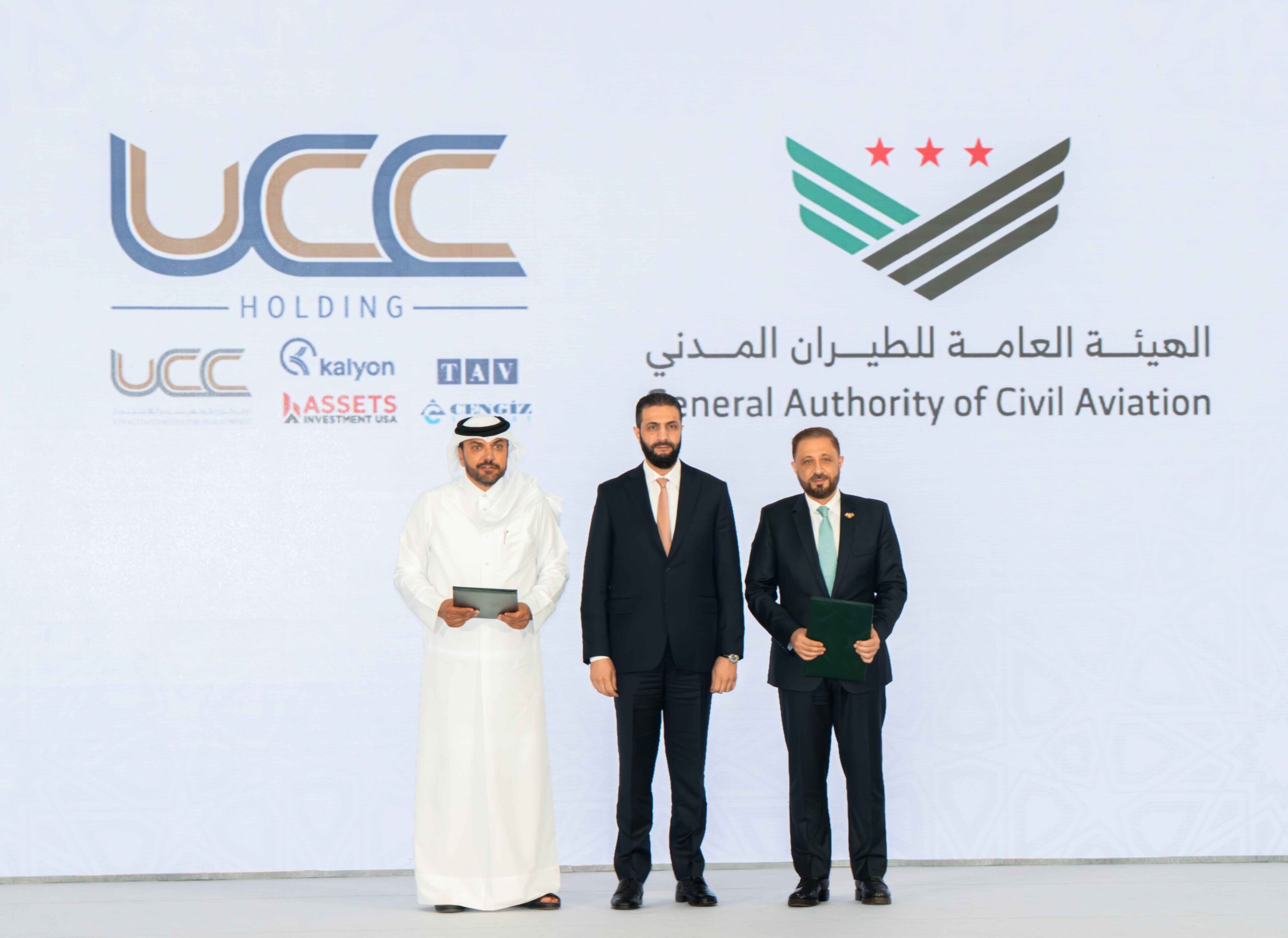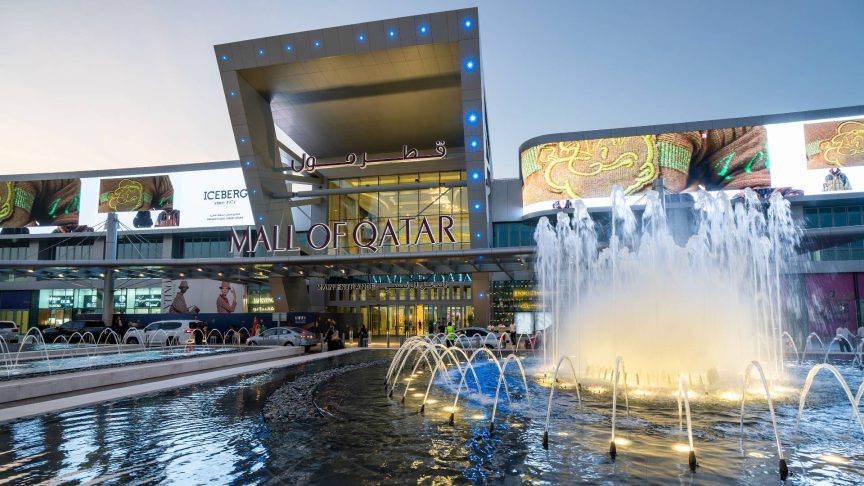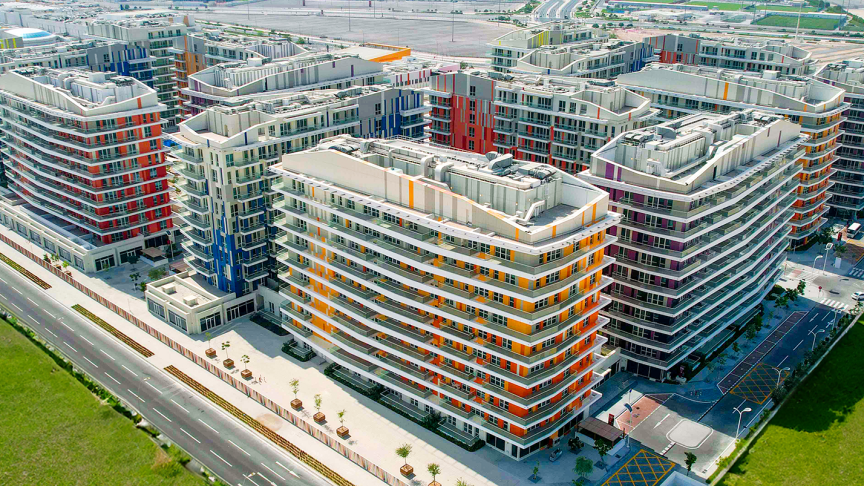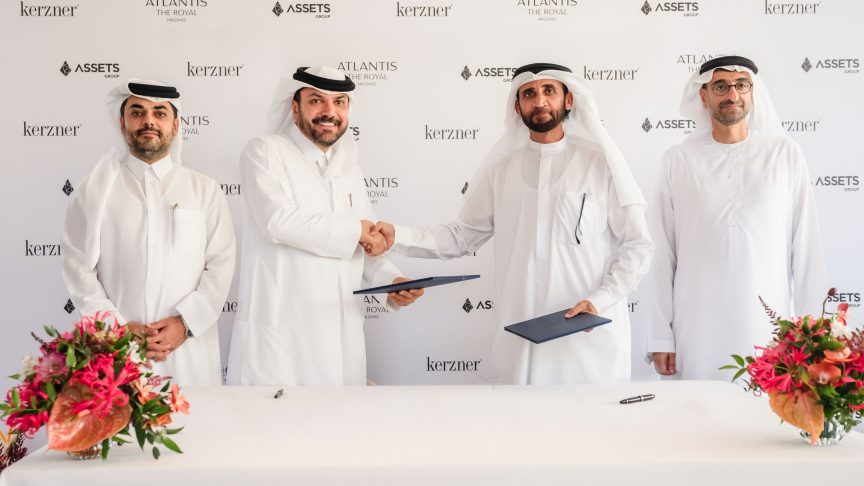With the support of Qatar and Under the patronage of His Excellency President Ahmad Al-Sharaa, President of the Syrian Arab Republic, the Syrian government has signed a strategic Memorandum of Understanding with a consortium of five international companies led by UCC Holding to develop and expand Damascus International Airport, with a foreign investment valued at over USD 4 billion. The project represents a cornerstone of the nation’s reconstruction efforts, aimed at enhancing global connectivity and contributing to the growth of the economy, trade, and tourism. It is considered a pivotal milestone in a series of major development projects being implemented in vital sectors such as energy, reconstruction, and infrastructure. This investment is one of the largest in Syria’s infrastructure in decades, reflecting the country’s drive to restore its regional and international standing.
The project will be implemented by an international consortium led by Qatar’s UCC Holding through its investment arm, UCC Concessions Investments LLC, and also includes Assets Investments USA LLC (USA), Cengiz İnşaat (Turkey), Kalyon İnşaat (Turkey), and TAV Tepe Akfen (Turkey).
The signing ceremony took place in Damascus in the presence of Mr. Tom Barrack, the U.S. Special Envoy to Syria, representatives of the Qatari Embassy in Syria, senior official delegations, and a number of diplomats. The agreement was signed by Mr. Omar Al-Husari, Chairman of the General Authority of Civil Aviation – representing the Government of the Syrian Arab Republic – along with Mr. Mohammad Moataz Al-Khayyat, Chairman of UCC Holding; Mr. Sani Şener, Chairman of TAV; Mr. Anthony Salter, CEO of Assets Investments USA; Mr. Murat Ergonul, Board Member of Cengiz İnşaat; and Mr. Mustafa Kocar, CEO of Kalyon İnşaat.
This investment aims to redevelop Damascus International Airport into an integrated regional hub capable of handling 31 million passengers annually upon completion of all phases, with world-class public facilities. The project will be executed under a Build–Operate–Transfer (BOT) model in five successive phases: increasing capacity to 6 million passengers in the first year, 16 million upon completion of the second phase, and ultimately reaching 31 million passengers annually at full capacity. The airport will be built to the highest international standards approved by the International Civil Aviation Organization (ICAO) and the International Air Transport Association (IATA), featuring up to 32 gates equipped with modern passenger boarding bridges, a fully integrated air navigation service system, and a world-class duty-free area housing a wide selection of international restaurants, upscale cafés, and leading fashion brands—making it one of the most modern and advanced airports in the region.
The project also includes the development of the main access road to the airport, stretching up to 50 km, in addition to USD 250 million in financing to purchase up to 10 Airbus A320 aircraft for Syrian Airlines, aimed at enhancing the fleet and increasing the competitiveness of the national carrier.
Mr. Mohammad Moutaz Al-Khayyat, Chairman of UCC Holding, stated:
“This project embodies the outcome of a strategic partnership bringing together a select group of leading international companies with a unified goal: rebuilding one of Syria’s most vital facilities in a way that reflects its future ambitions. At UCC Holding, we believe that the success of projects of this magnitude requires the integration of global expertise with a deep understanding of local market needs—a principle we aim to apply in every stage of implementation. We also wish to express our profound appreciation to His Highness Sheikh Tamim bin Hamad Al Thani, Amir of the State of Qatar, may God protect him, for his unwavering support and guidance in enabling the Qatari private sector to contribute to building a new Syria and to undertake strategic projects that bolster the Syrian economy.”
Mr. Ramez Al-Khayyat, President and Group CEO of UCC Holding, said:
“This project is not just about redeveloping Damascus International Airport; it is a strategic bridge carrying Syria toward a future of recovery and prosperity. We are investing in a sustainable development vision that enhances trade and tourism, connects Syria to the world at the highest standards, and stimulates economic growth and investment across all sectors. Leveraging Syria’s strategic location and our extensive local and regional partnerships, Damascus International Airport will become a model for advanced, smart transportation projects in the region.”
Mr. Sani Şener, Chairman of TAV, commented:
“We view this project as a strategic investment opportunity that goes beyond infrastructure development. It is a gateway to revitalizing the Syrian economy and reintegrating it into regional and global trade and investment flows. We bring to this investment our accumulated expertise in developing and operating major transportation projects to deliver a world-class airport that enhances the efficiency of the aviation sector, boosts the attractiveness of the Syrian market to global capital, and paves the way for a new era of growth and stability.”
It is noteworthy that UCC Holding has previously worked on the development and execution of several landmark airports, including Hamad International Airport in Qatar, Rwanda International Airport, and Tripoli Airport in Libya, and now adds the redevelopment and operation of Damascus International Airport to its portfolio of major strategic projects in the region.
The U.S. and Turkish consortium partners also have extensive experience in developing and operating major airports worldwide, having contributed to landmark projects such as Istanbul New Airport—the largest airport project in the world today—delivered through the İGA consortium led by Kalyon and Cengiz, as well as Ordu–Giresun Airport and Rize–Artvin Airport in Turkey, Istanbul Atatürk Airport, Ankara Esenboğa Airport, Gazipaşa–Alanya Airport, Prince Mohammad bin Abdulaziz International Airport in Medina, King Khalid International Airport – Terminal 5 in Riyadh, Tbilisi International Airport and Batumi International Airport in Georgia, Enfidha–Hammamet Airport in Tunisia, Skopje and Ohrid Airports in North Macedonia, and the Terminal 3 expansion at Cairo International Airport in Egypt.
The project is expected to create more than 90,000 direct and indirect jobs, strengthen the local economy across multiple sectors, and enable Syria to return as an active player in the regional and international aviation network, becoming a leading strategic hub in the region.





